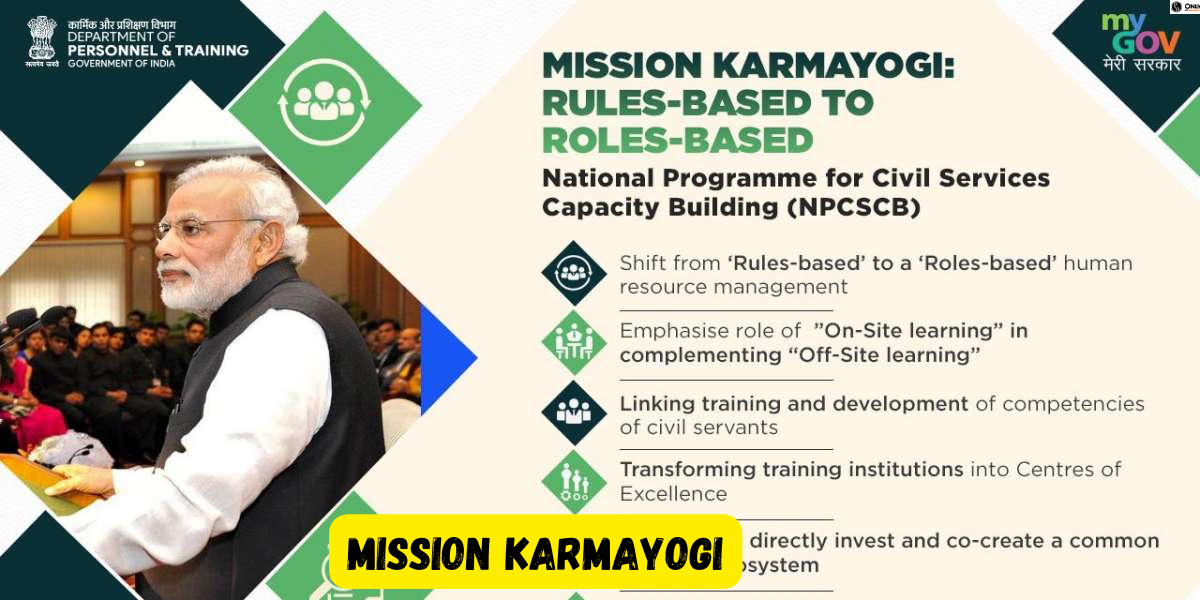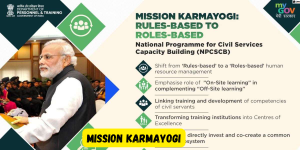Mission Karmayogi is an initiative aimed at transforming the training and development of civil servants in India. Karmayogi Saptah is a dedicated week to promote continuous learning and skill development.

Mission Karmayogi: Recently, during the National Learning Week, Prime Minister Narendra Modi launched “Karmayogi Saptah” from October 19 to 25, 2024, highlighting the importance of continuous learning for government employees. On October 21st around 13 employees received the “Adarsh Karmayogi Awards” for completing over 100 courses on the iGOT Karmayogi portal.
This recognition encourages lifelong learning and enhances the ability of the Ministry to provide better services to citizens. Mission Karmayogi is a key program by the Indian government aimed at improving the training of civil servants, shifting from a strict “rule-based” system to a more flexible, “role-based” and citizen-focused approach.
The Union government initiated a significant and long-awaited reform in the Indian bureaucracy through the launch of ‘Mission Karmayogi,’ part of the National Programme for Civil Services Capacity Building (NPCSCB) in September 2020. This mission aims to revolutionize capacity-building in the bureaucracy through institutional and process reforms.
It envisions preparing Indian civil servants for the future by fostering creativity, constructive thinking, innovation, transparency, and technological proficiency while remaining rooted in Indian culture. Launched by the Union Cabinet on September 2, 2020, this mission aims to lay the foundations for enhancing the capacity of Indian civil servants and fostering better governance. Here are the key details about the mission, relevant for the UPSC exam preparation.
The Annual Capacity Building Plan (ACBP), Mission Karmayogi is a comprehensive strategic document designed to aid in the development and improvement of the skills and abilities of individuals, as well as Ministries/Departments/Organizations (MDOs). The plan has been created by the Capacity Building Commission in close collaboration and consultation with the Mission Karmayogi Cell of the Health Ministry, all divisions within the department, and following a thorough Training Needs Analysis (TNA) for the Ministry of Health and Family Welfare (MoHFW).

Karmayogi Saptah is a week-long learning program (from 19th October to 25th October 2024) launched by Prime Minister Narendra Modi to enhance the skills of government employees. This initiative focuses on continuous education, aiming to prepare civil servants for the challenges of the future. During this week, participants will engage in various courses and activities designed to improve their knowledge and capabilities.
The goal of Karmayogi Saptah is to create a more efficient and citizen-centric government, aligning with India’s vision for Viksit Bharat by 2047. Through this program, the government hopes to promote a culture of lifelong learning among its employees.
Integrated Government Online Training (iGOT) is named under the Ministry of Human Resources and Development (MHRD).
‘Mission Karmayogi’ is a commendable step toward building a more efficient and future-ready bureaucracy. It addresses the need for a paradigm shift in bureaucratic functioning, emphasizing continuous learning, competency-based recruitment, and a departure from traditional approaches. However, addressing political interference and ensuring active participation in the training programs are additional challenges that must be addressed for the reform to be truly transformative.
| Also Read | |
| One Nation One Ration Card Scheme (ONORCS) | PM SVANidhi Scheme |
| SATAT Scheme | PM AASHA Scheme (Pradhan Mantri Annadata Aay SanraksHan Abhiyan) |
| Must Read | |
| NCERT Notes For UPSC | UPSC Daily Current Affairs |
| UPSC Blogs | UPSC Daily Editorials |
| Daily Current Affairs Quiz | Daily Main Answer Writing |
| UPSC Mains Previous Year Papers | UPSC Test Series 2024 |
The mission of the Karmayogi scheme is to transform civil service training from a rule-based to a role-based, citizen-centric approach, enhancing the skills and effectiveness of government employees.
Mission Karmayogi is an initiative by the Indian government aimed at transforming civil service training to focus on continuous learning and skill development
The Karmayogi Sapath is a commitment made by civil servants in India to uphold the principles of Mission Karmayogi, emphasizing continuous learning, accountability, and a citizen-centric approach in their service delivery
Mission Karmayogi was launched on September 2, 2020.
The mission of the Karmayogi vision is to create a more efficient and responsive civil service in India.

<div class="new-fform">
</div>